Body of Zambian student killed in Ukraine returnedpublished at 14:26 GMT 12 December 2022
Lemekhani Nyirenda was serving a nine-year prison sentence when he went off to fight for Russia.
Read MoreThis is an automated feed overnight and at weekends
Lemekhani Nyirenda was serving a nine-year prison sentence when he went off to fight for Russia.
Read More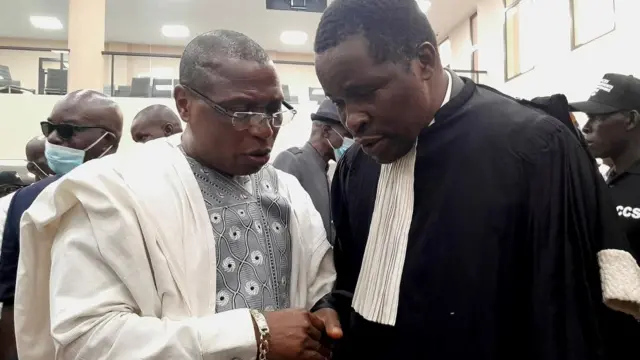 Image source, Reuters
Image source, ReutersMoussa Dadis Camara was pictured talking to his lawyer in court in September
A former military leader of Guinea, Moussa Dadis Camara, has denied being behind the 2009 stadium massacre at a trial in the capital, Conakry, the AFP news agency reports.
More than 150 people were killed, and women and girls were raped at the protest against military rule 13 years ago.
Monday was the first time that Capt Camara gave evidence at the trial which began in September.
Ten other former officials are on trial alongside Capt Camara, who is charged with having command responsibility over the soldiers who carried out the alleged crimes.
Capt Camara told the judge that he does not recognise the charges and then proceeded to make a long speech in which he referenced European philosophers and Egyptian Pharaohs, AFP reports.
On the day of the killings, 28 September 2009, security forces tried to stop the rally going ahead and allegedly blocked off the exits to a stadium in Conakry, before opening fire. Some protesters were shot dead or attacked with knives, while others were trampled on.
The long-delayed trial is the first involving human rights violations on this scale in Guinea, rights group Human Rights Watch has said.
Capt Camara was supposed to have given evidence last week but proceedings were delayed as he was unwell.
The 58-year-old seized power in 2008 when long-time President Lansana Conté died, but he was ousted and fled the country not long after the Conakry killings, following an assassination attempt.
He had been living in Burkina Faso before returning to Guinea for the trial.
Keisha Gitari
BBC Africa
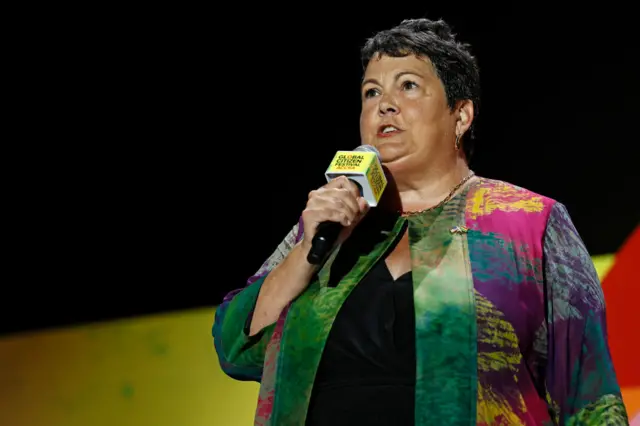 Image source, Getty Images
Image source, Getty ImagesVirginia Palmer, seen here in September, says she wants gay people to be safe in Ghana
US Ambassador to Ghana Virginia Palmer has told local station JoyNews, external that calls for the protection of the rights of persons of same-sex orientation should not be misinterpreted as an attempt to promote such interests.
“We don’t want your straight children to be gay, we want your gay children to be safe and I think it is very important that any sort of threat on one group demonstrates that the rights of other people can be encroached upon,” she said.
Speaking in an interview with JoyNews’ Foreign Affairs program, Ambassador Palmer stated that discrimination of all kinds is bad, hence the need for social protection measures to safeguard the minority group.
Intimate same-sex relationships are punishable in Ghana with a prison term of three years.
A bill named the “Promotion of Proper Human Sexual Rights and Ghanaian Family Values”, was proposed months after Ghana’s first LGBT community centre opened in Accra in January last year.
The bill seeks to increase jail terms to up to a decade and makes cross-dressing and public displays of same-sex affection punishable by fines or detention. It also makes the distribution of material deemed pro-LGBT by news organisations or websites illegal.
Watch this film on how some in Ghana's gay community have been treated:
Members of Ghana’s LGBT community speak out about anti-gay discrimination
 BBC Monitoring
BBC Monitoring
The world through its media
A group of Somali police officers, who completed a training programme in Djibouti, returned to Mogadishu on Sunday, state-owned Somali National TV reported, external.
Police commissioner General Abdi Hassan Mohamed Hijar, who welcomed the officers at the airport, said the training was jointly conducted by instructors from Djibouti and Italy.
"The training was held through collaboration efforts of the governments of Italy, Djibouti and Somalia," Mr Hijar said, adding that the Italian instructors accompanied the officers to Mogadishu.
Mr Hijar said that the police officers would join the fight against al-Shabab.
The state TV said this was the 17th batch of police officers that had trained in Djibouti and returned to the county.
Former double Olympic 800m champion David Rudisha avoids injury after a plane he is travelling in crash-lands in Kenya.
Read More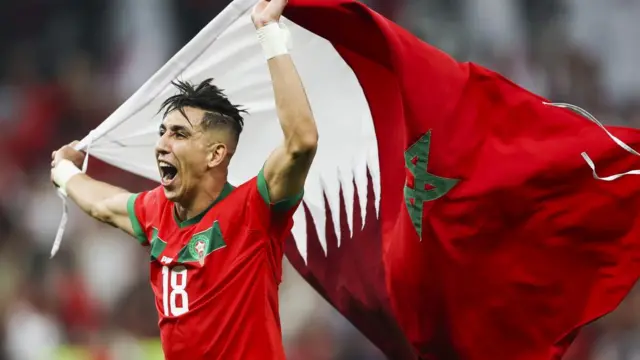 Image source, EPA
Image source, EPANigeria's President Muhammadu Buhari has congratulated Morocco on making history by becoming the first African country to reach the Wold Cup semi-finals.
The Atlas Lions have beaten Belgium, Spain and Portugal to reach this unprecedented position. The team has only conceded one goal in five matches.
He said Morocco had "made the entire continent proud with their grit and dexterity, giving hope that an African team can indeed win, and should win the ongoing global championship in Qatar", according to a statement from state house.
Mr Buhari also gave credit to the authorities in Morocco for helping put together such a strong team.
Nigeria was not among Africa's five teams to play at Qatar 2022.
The president's spokesperson has tweeted the statement:
Allow X content?
This article contains content provided by X. We ask for your permission before anything is loaded, as they may be using cookies and other technologies. You may want to read X’s cookie policy, external and privacy policy, external before accepting. To view this content choose ‘accept and continue’.
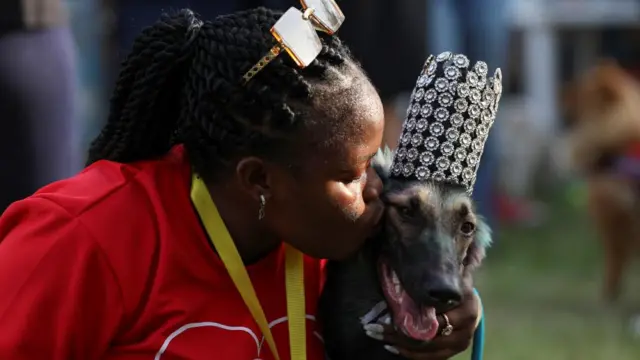 Image source, Reuters
Image source, ReutersDog owners came out in Nigeria's commercial hub, Lagos, to show off their pooches at the city's fourth annual canine carnival at the weekend, Reuters news agency reports.
The dogs on show came out beautifully groomed and in fancy dress.
 Image source, Reuters
Image source, ReutersThe aim was to break stereotypes that Africans mistreat their pets, Reuters says quoting organiser Jackie Idimogu.
"I have been able to make humans understand that dogs are not for guards, like they are not just to be kept at the gate or outside the compound," she said.
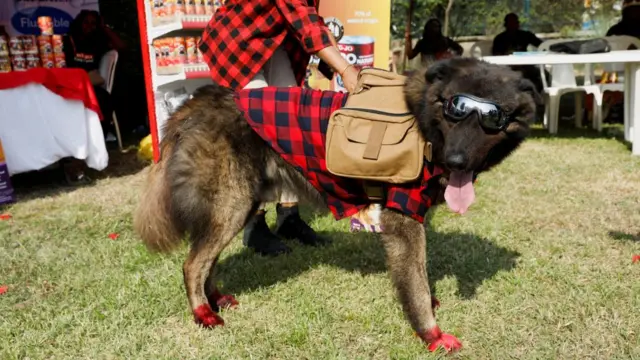 Image source, Reuters
Image source, ReutersPasha (above) - dressed in sunglasses and an outfit to match the owner's - was named dog of the year.
 Image source, Reuters
Image source, Reuters Will Ross
Will Ross
Africa editor, BBC World Service
Zambian police say they will increase checks of vehicles at the country's borders following the discovery over the weekend of the bodies of 27 Ethiopian migrants.
The men - all aged between 20 and 38 - were found dumped by the side of the road on the outskirts of the Zambian capital, Lusaka.
They are thought to have suffocated whilst trying to reach South Africa.
One man found gasping for air was taken to hospital.
In October, the bodies of 25 Ethiopians were discovered in neighbouring Malawi.
The UN says 12,000 migrants have been recorded as missing across Africa since 2014.
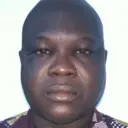 Nichola Mandil
Nichola Mandil
BBC News, Juba
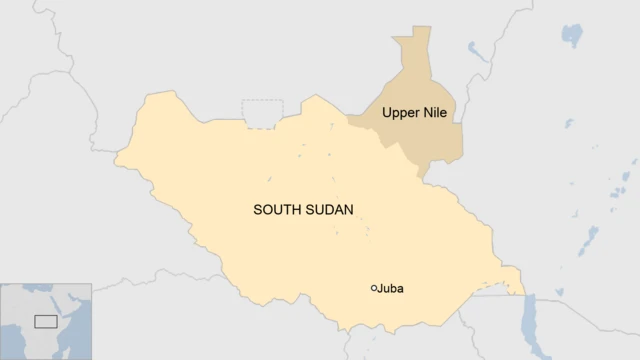
Nearly 40,000 people have been displaced from their homes following renewed fighting in South Sudan’s oil-rich Upper Nile state, an UN agency has said.
In its latest update, the UN’s Office for the Coordination of Humanitarian Affairs (Ocha) said threats of violence continue to hamper humanitarian response in the state.
It said the displaced people were living in dire conditions and required urgent life-saving assistance.
Last week ceasefire monitors said they would send a team to investigate the ongoing deadly clashes in the state.
Fighting has been reported in the state since state mid-November – reportedly involving the national army and the Maiwut opposition forces.
There are also reports of renewed hostilities in Fashoda area between different ethnic rival groups.
A prominent civil society group, the Community for Progress Organisation (CEPO), told the BBC that it received credible reports from civilians about armed youths amassing troops in the state over the weekend.
The BBC could not independently verify this information.
Kenyan world 800m athletics record holder David Rudisha has told local media how he survived after a plane he was travelling in crash-landed on Saturday evening.
The plane which was carrying him and five others came down near a park in Kajiado county in Kenya's south-east.
“All was well close to seven or eight minutes into the flight when the engine of the plane suddenly went quiet,” the retired Olympic champion told the Daily Nation newspaper, external.
Rudisha described the moment as scary, when one of the plane’s wings hit a tree, spun and landed on a rocky field. Pictures from the scene suggest that the plane also flipped over.
One of the occupants was reportedly being treated in a hospital with injuries after the crash. Others who had minor injuries were taken to hospital and later discharged.
Rudisha was reportedly unhurt.
He had been on his way back from attending the annual Maasai Olympics event at Kimana Wildlife Sanctuary in Kajiado county.
Rudisha holds the 800m world record after a stunning performance at the London Olympics in 2012. He is now retired but has suggested that he is considering going into coaching.
Photos of the crash incident have been shared widely:
Allow X content?
This article contains content provided by X. We ask for your permission before anything is loaded, as they may be using cookies and other technologies. You may want to read X’s cookie policy, external and privacy policy, external before accepting. To view this content choose ‘accept and continue’.
Kenyan learners will soon start being taught coding from primary schools to the universities, President William Ruto has said.
He said the initiative was meant to improve the prospects of young Kenyans in the digital age.
Mr Ruto explained:
Quote MessageYou have heard about coding which is going to be part of our curriculum, to make sure that coding and the whole computer eco-system and tech eco-system becomes part of our journey from primary school all the way to our universities."
He made the remarks at a tech and innovation summit attended by representatives from Meta, Microsoft and Google.
Kenya's previous ambitious attempt to provide learners in primary schools with laptops failed to take off in 2013.
This was largely down to some schools lacking the most basic equipment, poor teacher training and allegations of corruption in the procurement process.
Listen to President Ruto's comments from 56:30.
Allow X content?
This article contains content provided by X. We ask for your permission before anything is loaded, as they may be using cookies and other technologies. You may want to read X’s cookie policy, external and privacy policy, external before accepting. To view this content choose ‘accept and continue’.
Zimbabwe's ruling Zanu-PF party has blamed former long-time leader Robert Mugabe for the country's severe power outages.
Mugabe was ousted in 2017 after nearly four decades in office.
Over the last fortnight Zimbabweans have been facing power cuts lasting up to about 18 hours a day. The crisis worsened following low water levels at Kariba South power station.
Zanu-PF spokesman Chris Mutsvangwa told South African broadcaster eNCA that his country was now grappling with the effects of the previous administration's "neglect" to invest in power generation over the years.
"The economic management of the last two decades of [President] Mugabe is retarding the speed of recovery; but you can't doubt that there's a recovery which is going on," the spokesman said.
The party has been in power since 1980 when the country gained independence from Britain.
Allow YouTube content?
This article contains content provided by Google YouTube. We ask for your permission before anything is loaded, as they may be using cookies and other technologies. You may want to read Google’s cookie policy, external and privacy policy, external before accepting. To view this content choose ‘accept and continue’.
Read more on this story:
African leaders are heading to Washington ahead of the US-Africa summit that will be hosted by President Joe Biden.
The three-day summit begins on Tuesday and will aim to demonstrate the commitment of President Biden's administration to the continent, according to organisers.
A total of 49 heads of state and African Union Commission Chairperson Moussa Faki Mahamat have been invited to the summit.
Mali, Guinea, Sudan and Burkina Faso - which are suspended by the African Union - were not invited. Eritrea was also excluded.
Some African leaders have been tweeting about their departure to the summit:
Allow X content?
This article contains content provided by X. We ask for your permission before anything is loaded, as they may be using cookies and other technologies. You may want to read X’s cookie policy, external and privacy policy, external before accepting. To view this content choose ‘accept and continue’.
Allow X content?
This article contains content provided by X. We ask for your permission before anything is loaded, as they may be using cookies and other technologies. You may want to read X’s cookie policy, external and privacy policy, external before accepting. To view this content choose ‘accept and continue’.
Allow X content?
This article contains content provided by X. We ask for your permission before anything is loaded, as they may be using cookies and other technologies. You may want to read X’s cookie policy, external and privacy policy, external before accepting. To view this content choose ‘accept and continue’.
Nigerian musician Wizkid has apologised for failing to show up for his planned performance at a concert in Ghana.
The Nigerian superstar, whose real name is Ayodeji Ibrahim Balogun, was due to appear at the Accra Sports stadium on Saturday.
But he was a no-show, leaving many of his Ghanaians fans angry, including those who had turned up at the venue and waited for hours to see him perform.
The show's promoters, Live Hub, accused the Afrobeats singer of “breaching his contractual obligation”.
But on Sunday night the music star apologised “to everyone who made the effort to come out for me [on Saturday night]. I was charged up, and looking forward to doing this show.”
“Unfortunately, up until the day of this show, there continued to be safety and production issues that prevented me from putting on a high-quality show that my fans deserve,” he posted on Twitter.
He said he and his team were working on “delivering a show to my amazing fans in Ghana”.
Allow X content?
This article contains content provided by X. We ask for your permission before anything is loaded, as they may be using cookies and other technologies. You may want to read X’s cookie policy, external and privacy policy, external before accepting. To view this content choose ‘accept and continue’.
 BBC World Service
BBC World Service
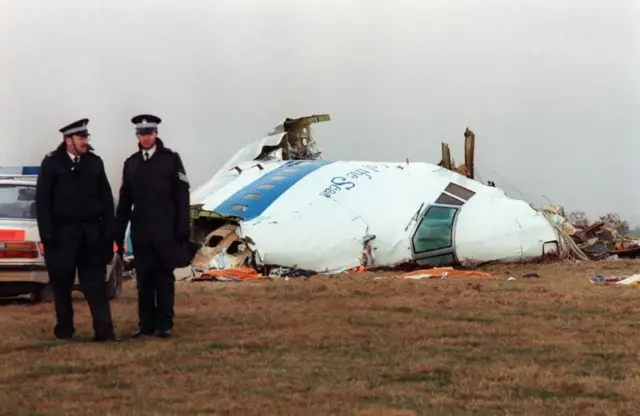 Image source, Getty Images
Image source, Getty ImagesThe Lockerbie bombing happened on 21 December 1988
The families of the victims of the 1988 bombing of a Pan-Am plane have expressed both concern and delight about the arrest, by the United States, of a Libyan man suspected of making the bomb that destroyed the aircraft over the Scottish town of Lockerbie.
All 259 passengers and crew on board the Boeing 747 bound for New York from London died while another 11 people were killed in Lockerbie when the wreckage destroyed their homes.
The Reverend John Mosey - whose daughter died in the attack - says the case of Abu Agila Masud should be heard under the Scottish legal system.
But Kara Weipz, whose brother Richard Monetti was on board the flight said the suspect's arrest and trial in the US was an amazing feat.
Only one man - Abdul Basset al Megrahi - has ever been convicted over the bombing.
 BBC World Service
BBC World Service
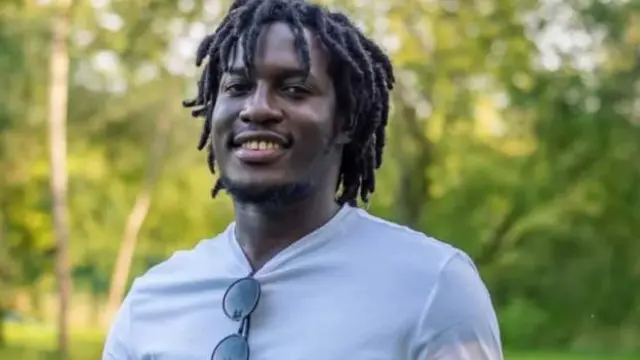 Image source, Zambians in Moscow/Facebook
Image source, Zambians in Moscow/FacebookLemekhani Nyirenda had been studying nuclear engineering in Moscow
Grieving relatives of a Zambian student who died while fighting in Ukraine as a mercenary for Russia have greeted the return of his body on Sunday at Lusaka airport.
Lemekhani Nathan was killed last month.
The Wagner paramilitary group said it had recruited him from a Russian prison, where he was serving a sentence for a drugs conviction.
Wagner said he had voluntarily joined up before dying "a hero".
Zambia has demanded a full explanation.
The AFP news agency quotes a family spokesman as saying that the body was to be transferred to a morgue for an autopsy with a burial date to follow.
Our proverb of the day:
Quote Message'Leaving the milk open, they call someone a thief,' said the cat."
An Oromo proverb from Ethiopia sent by Jeneral Jo.
Finance has traditionally been dominated by men. But now that’s starting to change. We talk to the female entrepreneurs in Africa who are using financial technology to give more people access to money and services - through apps, payment platforms and chatbots.
Odunayo Eweniyi is the co-founder of Piggyvest in Nigeria, the first ever online app for personal savings and investment in West Africa. She tells us how she came up with the idea and how she’s using FirstCheck Africa, an angel fund for women entrepreneurs, to help others.
Jihan Abass, the founder and CEO of Griffin insurance, Kenya’s first digital-only car insurance company, tells us about her ambitious plans to expand. Ethel Cofie, the boss of Edel Technology Consulting, who’s been named as one of the top 5 women influencing technology in Africa, gives her advice to women starting out in tech. She’s set up a support network, Women in Tech Africa.
We also visit a coding bootcamp for young women in Ghana, called Developers in Vogue. Its founder, Ivy Barley, tells us why she set it up and we hear from the students about the difference it’s made to their lives.
Presenter and producer: Jo Critcher
(Picture: Students at Developers in Vogue coding bootcamp in Ghana; Credit: Developers in Vogue)
What’s it like to live in a country on the sharp end of climate change? Today Tamasin Ford takes you to Sâo Tomé and Príncipe, the twin island nation in the gulf of Guinea. With the smallest economy in Africa, it has few means to fight what the UN calls the biggest threat modern humans have ever faced. We hear from coastal communities whose homes have been washed away because of rising sea levels.
President Carlos Vila Nova, who spoke at the United Nation’s climate conference in Glasgow last year, lays out the challenges small island nations face. While Luisa Madruga from the charity, Flora and Fauna International, explains how a new initiative could save fish stocks from disappearing altogether.
Presenter: Tamasin Ford Producer: Russell Newlove Photo: Principe, the community of Praia de Burras; Credit: BBC
Hundreds of young women from Sierra Leone, West Africa, have been trapped in the Arabian sultanate of Oman, desperate to get home. Promised work in shops and restaurants, they say they were tricked into becoming housemaids, working up to 18 hours a day, often without pay, and sometimes abused by their employers. Some ran away, to live a dangerous underground existence at the mercy of the authorities. Now, they are being rescued with the help of charities and diplomats. Back home, some have empowered themselves for the first time, joining a women’s farming collective. But others can’t easily recover from the ill-treatment and isolation they suffered in Arabia. (Updated version of a programme first broadcast earlier this year.)
Reporter: Tim Whewell.
(Photo: Sierra Leonean women hoping for repatriation after leaving their employers in Oman. Credit: Do Bold)